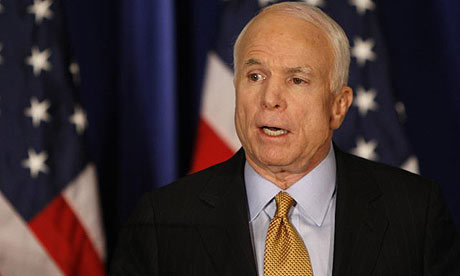- The Guardian,
- Friday September 26 2008
- Article history

John McCain announces he is suspending his campaign to work on the economic bailout package on Wednesday. Photograph: Gerald Herbert/AP
John McCain last night was accused of sabotaging the Wall Street bail-out with theatrics that reduced America's credit crisis to a showcase for his presidential leadership capabilities.
The furious words for the Republican candidate came from Democrats came after a contentious meeting at the White House between George Bush and congressional leaders meant to seal a deal on a $700bn rescue package. Both McCain and Barack Obama also attended the meeting.
The extraordinary session had been called after McCain's stunning announcement on Wednesday that he would suspend his campaign and would seek a delay in tonight's presidential debate to try to personally help steer through a deal on the bail-out. By midday yesterday, congressional leaders said they had reached the outlines of a deal.
But that optimism appeared to have dissipated after the White House meeting.
Democrats and Republicans said that prospects for a deal vanished after McCain had tried to prod his fellow Republicans in another direction. The breakdown cast new uncertainty over Friday night's presidential debate in Mississippi, as well as the future of the bail-out itself.
McCain said he would not attend the debate until a deal is reached. Obama said he would go to the debate, and the University of Mississippi, which is hosting the event, said that it planned to go ahead.
Last night, Democrats were scathing of the Republican's posturing, saying he had jeopardised efforts to unite Congress around the plan put forward by the treasury secretary, Hank Paulson.
"This is the presidential campaign of John McCain undermining what Hank Paulson tells us is essential for the country," said Barney Frank, the Massachusetts congressman who had been leading negotiations for the Democrats. "This is McCain at the last minute getting House Republicans to undermine the Paulson approach."
Obama also chided McCain. "When you start injecting presidential politics into delicate negotiations you actually start creating more problems," he said.
The anger and uncertainty about the bail-out last night threatened to rebound against McCain's efforts to cast himself as above the political fray when it came to America's credit crisis. McCain had depicted the bail-out negotiations as a crisis requiring his personal attention.
"I'm an old navy pilot, and I know when a crisis calls for all hands on deck," he said in a speech to the Clinton Global Initiative in New York, before travelling to Washington. "As of this morning, I suspended my campaign. With so much on the line, for America and the world, the debate that matters most right now is taking place in the United States Capitol - and I intend to join it."
Obama continued to reject McCain's argument that the gravity of America's financial crisis should put the campaign on hold. "Our election is in 40 days," he said in his speech to the Clinton initiative, delivered from Florida where he was preparing for the debate. "The American people deserve to hear directly from myself and Senator McCain about how we intend to lead our country. The times are too serious to put our campaign on hold, or to ignore the full range of issues that the next president will face."
However, it was widely noted that McCain did not even arrive in Washington until after Democratic and Republic leaders announced they had the outlines of a rescue package. He admitted as recently as Tuesday he had not taken the time to even read the plan, according to an NBC transcript distributed by the Obama camp.
But that did not stop the Republican from seizing the headlines for two days in a row. McCain first wrong-footed Obama on Wednesday with his stunning announcement he would suspend his campaign and would not attend the debate.
Yesterday, he struck again, appropriating Obama's conditions for the rescue deal - barely 24 hours after rejecting them. The Democrat proposed the conditions in discussions with McCain on Wednesday about a joint statement on the crisis.
The Obama camp had called for an independent oversight board, a mechanism to protect taxpayers, a curb on outsized payments to Wall Street executives, and relief for homeowners faced with losing homes. The proposed joint statement also rejected attaching other measures, or earmarks, to the bill. In his speech yesterday McCain adopted near identical language - as well as the essence of four of the measures: an oversight board, protection for taxpayers, controls on Wall Street executives and a ban on earmarks; he made no mention of relief for homeowners.
McCain's urgency for reaching a deal comes after polls suggested the economic crisis was eroding Republican support.